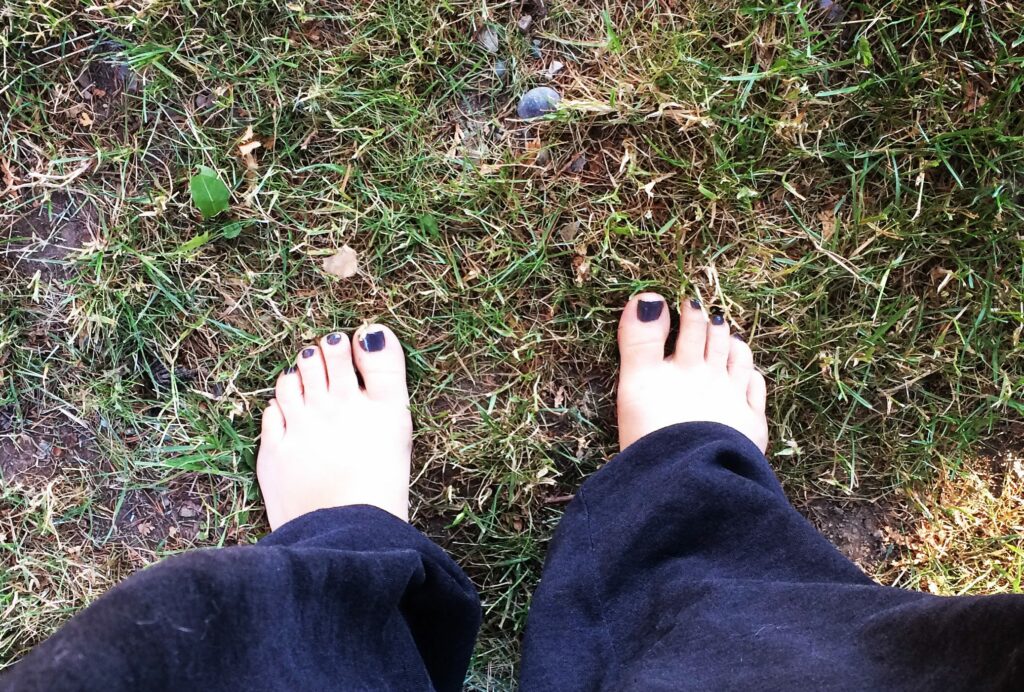
Blog Written by Dr Elisha Cook ND
If you are a patient of mine, you may have heard me explain this concept. In all reality, what comes to mind when someone uses these words is “hippy”, “Tree-hugger”, and “New – Age”; when the concepts are much more advanced than that.
Earthing or Grounding is described as the act connecting the body with the earth to cause a grounding or electrically balanced state. Ultimately, it revolves around grounding physics, similar to when we think about electricity in our home and grounding it. The intention of earthing or grounding is really for therapeutic gain. You might ask how reconnecting with the earth would cause any health benefits, but there is a fair amount of research that shows that this type of exercise can prove to be physiologically advantageous (i.e. it’s good for your health!).
What are the Health Benefits of Earthing or Grounding?
When we look at the research behind earthing or grounding, we see some pretty remarkable changes to ones physiology.
- Changes in white blood cells (immune system) (1)
- Changes in cytokines (inflammation) (1)
- Reduces blood viscosity and clumping (Cardiovascular) (2)
- Reduces cortisol (stress hormone) (3)
- Normalizes circadian rhythm (sleep) (3)
- Improves circulation (4)
- Mobilizes glucose and muscular uptake (Energy exertion and recovery) (5)
These physiological changes can translate to
- Reduced muscle soreness onset post injury (1)
- Reduced pain (1)
- Reduces risk of cardiovascular events (2)
- Reduced Stress (3)
- Improved Sleep (3)
- Improved Mood (6)
- Increased Relaxation (6)
- Improved energy with physical exertion (5)
How can I Earth or Ground?
When we say “reconnecting” with the earth, many would believe that this is a weird or exhaustive process when in all reality there are some very ways to reconnect with the earth that might actually already be apart of your everyday life.
- Walking barefoot in the grass
- Standing bare foot in the grass
- Lying with skin exposed on the ground
- Swimming in a pond, river, lake, ocean, etc.
- Having a shower
- Washing your hands
I will often suggest to patients that really any amount of time is better than nothing. The research is pretty mixed on the length of time needed to produce a benefit, but again, anything is better than nothing.
Have you benefited from reading this blog? Know someone that would benefit as well? Share, Like, Comment, or Tweet this article, and let me know what you think.
Some of the information provided above may not be appropriate for everyone, please consult with your doctor before trying any of the above. If you are interested in any of the above therapies to help you work through your health concerns and are wanting a different approach to your health care needs, contact the Plattsville Natural Health Clinic by calling 226-232-7665 and book your appointment today!
References:
- https://www.researchgate.net/profile/James_Oschman/publication/274644091_The_effects_of_grounding_earthing_on_inflammation_the_immune_response_wound_healing_and_prevention_and_treatment_of_chronic_inflammatory_and_autoimmune_diseases/links/555b14d708ae6fd2d8286cd1.pdf
- http://online.liebertpub.com/doi/abs/10.1089/acm.2011.0820
- “The effect of earthing (grounding) on human physiology”. Gaetan Chevalier, Kazuhito Mori, and James L. Oshman. European Biology and Bioelectromagnetics Jan 31 2006; 600-621.
- http://www.scirp.org/journal/PaperInformation.aspx?paperID=58836
- https://www.researchgate.net/profile/Zbigniew_Jastrzebski/publication/302590367_Earthing_modulates_glucose_and_erythrocytes_metabolism_in_exercise/links/5731e05a08ae298602da2942.pdf
- http://encompass.eku.edu/swps/2016/undergraduate/15/


